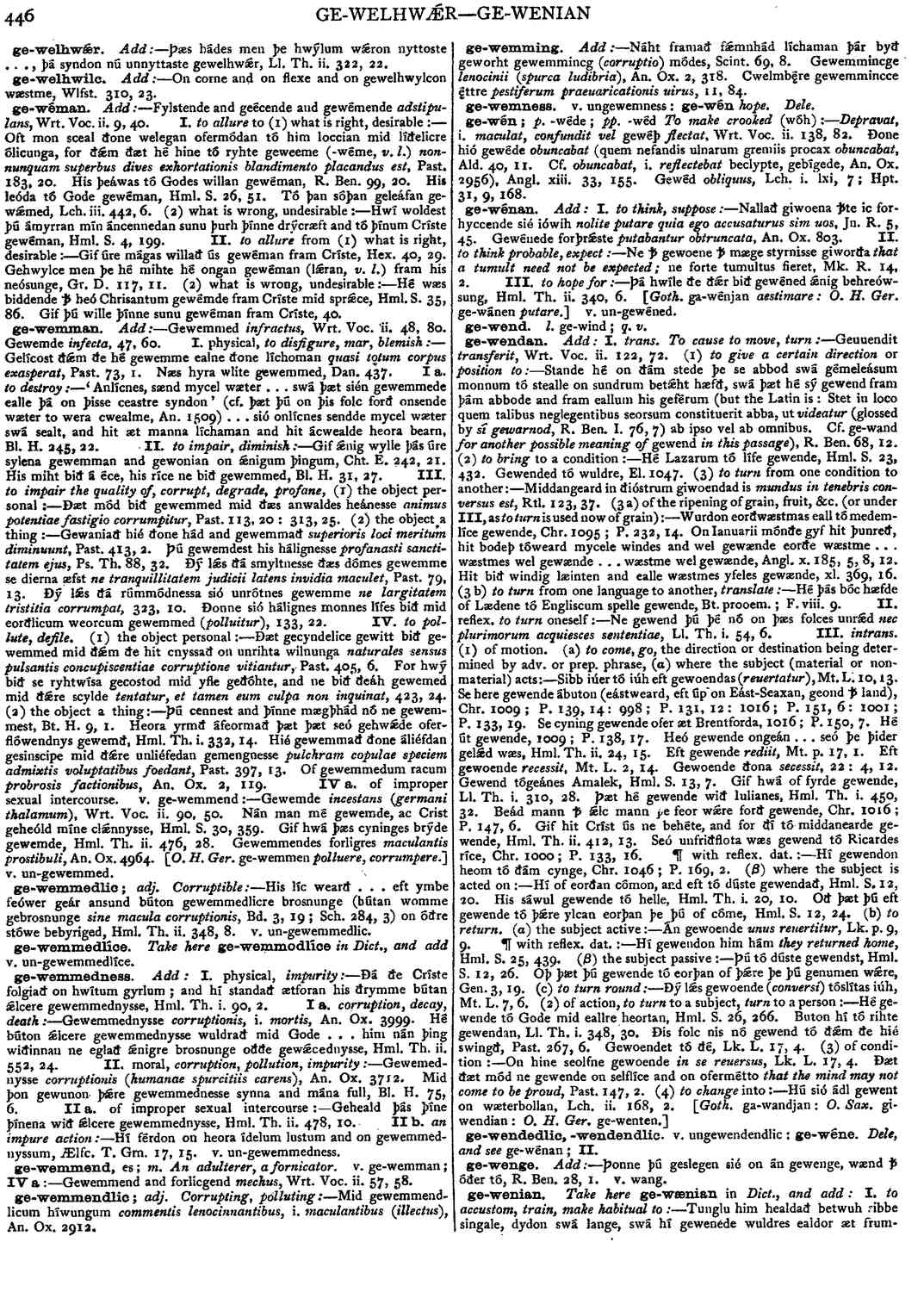ge-wendan
- verb
-
Geuuendit
transferit,
- Wrt. Voc. ii. 122, 72.
-
Stande hé on ðám stede þe se abbod swá gémeleásum monnum tó stealle on sundrum betǽht hæfð, swá þæt hé sý gewend fram þám abbode and fram eallum his geférum (but the Latin is: Stet in loco quem talibus neglegentibus seorsum constituent abba, ut
videatur (glossed by sí gewarnod, R. Ben. I. 76, 7) ab ipso vel ab omnibus. Cf. ge-wand for another possible meaning of gewend in this passage ),
- R. Ben. 68, 12.
-
Hé Lazarum tó lífe gewende,
- Hml. S. 23, 432.
-
Gewended tó wuldre,
- El. 1047.
-
Middangeard in ðióstrum giwoendad is mundus in tenebris conversus est, Rtl. 123, 37. (3 a) of the ripening of grain, fruit, &c. (or under III, as
to turn
is used now of grain) :-- Wurdon eorðwæstmas eall tó medemlíce gewende,- Chr. 1095; P. 232, 14.
-
On Ianuarii mónde gyf hit þunreð, hit bodeþ tóweard mycele windes and wel gewænde eorðe wæstme ... wæstmes wel gewænde ... wæstme wel gewænde,
- Angl. x. 185, 5, 8, 12.
-
Hit bið windig læinten and ealle wæstmes yfeles gewænde, xl. 369, 16. (3 b) to turn from one language to another,
translate
:-- Hé þás bóc hæfde of Lædene tó Engliscum spelle gewende,- Bt. prooem.; F. viii. 9.
-
Ne gewend þú þé nó on þæs folces unrǽd
nec plurimorum acquiesces sententiae,
- Ll. Th. i. 54, 6.
-
Sibb iúer tó iúh eft gewoendas(
reuertatur
),- Mt. L. 10, 13.
-
Se here gewende ábuton (eástweard, eft úp on Eást-Seaxan, geond ꝥ land),
- Chr. 1009; P. 139, 14: 998; P. 131, 12: 1016; P. 151, 6: 1001; P. 133, 19.
-
Se cyning gewende ofer æt Brentforda,
- 1016; P. 150, 7.
-
Hé út gewende,
- 1009; P. 138, 17.
-
Heó gewende ongeán ... seó þe þider gelǽd wæs,
- Hml. Th. ii. 24, 15.
-
Eft gewende
rediit,
- Mt. p. 17, 1.
-
Eft gewoende
recessit,
- Mt. L. 2, 14.
-
Gewoende ðona
secessit,
22:- 4, 12.
-
Gewend tógeánes Amalek,
- Hml. S. 13, 7.
-
Gif hwá of fyrde gewende,
- Ll. Th. i. 310, 28.
- Þæt hé gewende wið Iulianes. Hml. Th. i. 450, 32.
-
Beád mann ꝥ ǽlc mann þe feor wǽre forð gewende,
- Chr. 1016; P. 147, 6.
-
Gif hit Críst ús ne behéte, and for ðí tó middanearde gewende,
- Hml. Th. ii. 412, 13.
-
Seó unfriðflota wæs gewend tó Ricardes ríce,
- Chr. 1000; P. 133, 16. ¶
- with reflex. dat.
Hí gewendon heom tó ðám cynge,
- Chr. 1046; P. 169, 2.
-
Hí of eorðan cómon, and eft tó dúste gewendað,
- Hml. S. 12, 20.
-
His sáwul gewende tó helle,
- Hml. Th. i. 20, 10.
-
Oð þæt þú eft gewende tó þǽre ylcan eorþan þe þú of cóme,
- Hml. S. 12, 24.
-
Án gewoende unus reuertitur, Lk. p. 9, 9. ¶ with reflex. dat. :-- Hí gewendon him hám
they returned home,
- Hml. S. 25, 439.
-
Þú tó dúste gewendst,
- Hml. S. 12, 26.
-
Oþ þæt þú gewende tó eorþan of þǽre þe þú genumen wǽre,
- Gen. 3, 19.
-
Ðý lǽs gewoende (
conversi
) tóslítas iúh,- Mt. L. 7, 6.
-
Hé gewende tó Gode mid eallre heortan,
- Hml. S. 26, 266.
-
Buton hí tó rihte gewendan,
- Ll. Th. i. 348, 30.
-
Ðis folc nis nó gewend tó ðǽm ðe hié swingð,
- Past. 267, 6.
-
Gewoendet tó ðé,
- Lk. L. 17, 4.
-
On hine seolfne gewoende
in se reuersus,
- Lk. L. 17, 4.
-
Ðæt ðæt mód ne gewende on selflíce and on ofermétto
that the mind may not come to be proud,
- Past. 147, 2.
-
Hú sió ádl gewent on wæterbollan,
- Lch. ii. 168, 2.
Bosworth, Joseph. “ge-wendan.” In An Anglo-Saxon Dictionary Online, edited by Thomas Northcote Toller, Christ Sean, and Ondřej Tichy. Prague: Faculty of Arts, Charles University, 2014. https://bosworthtoller.com/50433.
Checked: 0